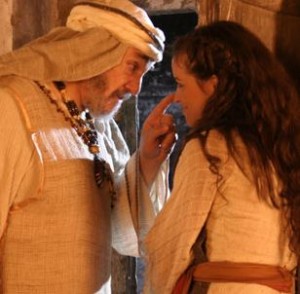by Fr. Patrick Henry Reardon
 The invisible and extremely mysterious activity of the hidden God in the Book of Esther is profitably contrasted to His clear, open, and miraculous intrusions into history in the Book of Daniel. When, for instance, the Lord intervenes to save His servants in the fiery furnace, there is nothing subtle about it. Even a person as obtuse as Nebuchadnezzar is able to take it in:
The invisible and extremely mysterious activity of the hidden God in the Book of Esther is profitably contrasted to His clear, open, and miraculous intrusions into history in the Book of Daniel. When, for instance, the Lord intervenes to save His servants in the fiery furnace, there is nothing subtle about it. Even a person as obtuse as Nebuchadnezzar is able to take it in:
“I see four men walking loose in the middle of the fire!”
The clarity attendant on God’s activity in the Book of Daniel also marks its presentation of the moral order. There are no shaded ethical subtleties in Daniel’s world. Right-or-wrong choices are easily identified. Moral options are invariably determined by an either/or. The choices are hard, but they are never uncertain. Obedience requires great courage, but little thought and no imagination.
This book provides a series of incidents in which Daniel and other brave souls simply stand up and tell the authorities “no.”
‘No, Your Majesty,’ they declare, ‘we decline to bow down and worship your stupid statue, we hold your fiery furnace in contempt, we will persist in praying to the true God three times each day, we are not the least intimidated your lions’ den, and we will gladly die rather than violate our kosher laws. So there, King, do your worst!’
In each of these episodes in the story of Daniel, he and his friends, who are prepared to die or suffer other consequences, are delivered by God’s intervening Providence. They engage in no casuistry; they make no effort to work out a deal with the king. They simply resist, come what may. Their whole moral stance is summed up in the declaration to Nebuchadnezzar:
“Now it may happen our God whom we serve-who is able to deliver us from the burning fiery furnace-will grant deliverance from your hand, O king. But if not, be assured of this, O king: We do not serve your gods, nor shall we worship the gold image you have set up” (Daniel 3:18).
From the fixed and clear moral universe portrayed in Daniel, we may turn to that of Esther. (In the Hebrew text these two works are found in immediate sequence, Esther coming first.) With respect to her moral obligation Esther is no less resolute than the three men at the entrance to the fiery furnace. She is fully aware that she endangers her life by entering into the throne room of Ahasuerus, but she does not flinch from the responsibility.
But here we encounter an irony: Esther’s very similarity to the young men facing Nebuchadnezzar illustrates her profoundly different moral situation. The characters in Daniel, in each of their moral choices, appeal to the Law of God. They refuse to adore the statue, because it would violate the Decalogue. They decline to partake of the king’s meats, for fear of unclean food. That is to say, the Torah, God’s revealed will, governs their moral choices. They live in a world where duties are spelled out. God’s commandments determine the outline of the moral universe. Perhaps we may call the moral order in the Book of Daniel a “morality of essence,” in the sense that the being of things establishes man’s moral duties.
This is not the case when we turn to the Book of Esther. The morality on trial here is not a “morality of essence.” Perhaps it should be called, rather, an “existential morality,” meaning that the duties of the devout people in this book are revealed to them, not by the Torah, not by a prior code, not in an explicit set of prescriptions, but through the concrete circumstances in which they find themselves. The ad hoc context of their existence contains its own moral imperatives.
Esther is not tempted to commit idolatry, nor is her fidelity to the kosher laws put to the test. Rather, she is faced with an existential situation in which she perceives a moral duty. She recognizes a personal responsibility inherent in the palpable circumstances of her life here-and-now. Nothing in the Torah dictates what Esther must do. She has only her morally sensitive conscience to guide her. Clearly that conscience has been shaped by the Torah, but now she encounters a moral situation about which Moses said nothing.
Arguably the moral choices the Book of Esther are, in this respect, more difficult than those of Daniel and his compatriots. While Mordecai and Esther do not compromise, any more than Daniel and his friends, they are obliged to work harder on how to remain morally faithful. They are forced to improvise. They must use their creative imaginations and figure out a way through their dilemma imposed on their lives.
Part of their more severe difficulty, perhaps, is the sheer size and gravity of the threat they faced. The Book of Esther poses a dilemma far worse than any faced in the Book of Daniel: the whole Jewish people is at risk, not simply these few faithful Jews. Esther and Mordecai must save everybody. The entire Jewish People is at risk. What is at issue in this book is truly an Endlösung der Judenfrage. Esther and Mordecai do not have the luxury of keeping their hearts pure and facing a martyr’s death. They must use their heads and, if they can, devise some creative plan to circumvent the disaster that hangs over their countrymen.
